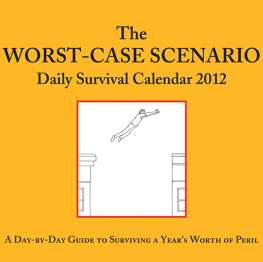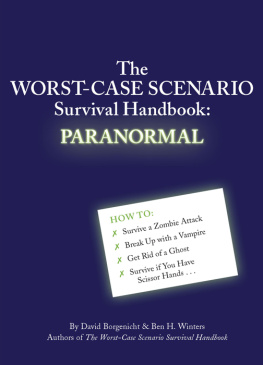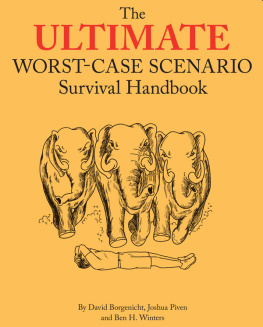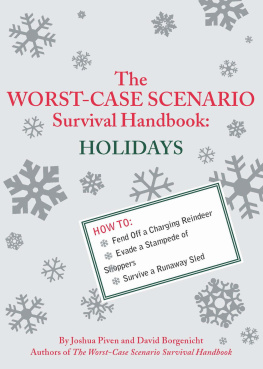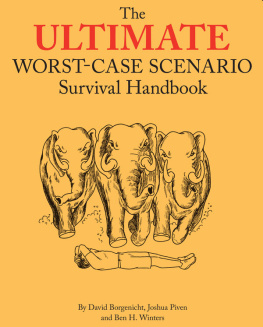Joshua Piven - 2013 Daily Calendar: Worst-Case Scenario
Here you can read online Joshua Piven - 2013 Daily Calendar: Worst-Case Scenario full text of the book (entire story) in english for free. Download pdf and epub, get meaning, cover and reviews about this ebook. year: 2012, publisher: Chronicle Books, genre: Non-fiction. Description of the work, (preface) as well as reviews are available. Best literature library LitArk.com created for fans of good reading and offers a wide selection of genres:
Romance novel
Science fiction
Adventure
Detective
Science
History
Home and family
Prose
Art
Politics
Computer
Non-fiction
Religion
Business
Children
Humor
Choose a favorite category and find really read worthwhile books. Enjoy immersion in the world of imagination, feel the emotions of the characters or learn something new for yourself, make an fascinating discovery.
- Book:2013 Daily Calendar: Worst-Case Scenario
- Author:
- Publisher:Chronicle Books
- Genre:
- Year:2012
- Rating:5 / 5
- Favourites:Add to favourites
- Your mark:
- 100
- 1
- 2
- 3
- 4
- 5
2013 Daily Calendar: Worst-Case Scenario: summary, description and annotation
We offer to read an annotation, description, summary or preface (depends on what the author of the book "2013 Daily Calendar: Worst-Case Scenario" wrote himself). If you haven't found the necessary information about the book — write in the comments, we will try to find it.
Joshua Piven: author's other books
Who wrote 2013 Daily Calendar: Worst-Case Scenario? Find out the surname, the name of the author of the book and a list of all author's works by series.
2013 Daily Calendar: Worst-Case Scenario — read online for free the complete book (whole text) full work
Below is the text of the book, divided by pages. System saving the place of the last page read, allows you to conveniently read the book "2013 Daily Calendar: Worst-Case Scenario" online for free, without having to search again every time where you left off. Put a bookmark, and you can go to the page where you finished reading at any time.
Font size:
Interval:
Bookmark:

To deal with the worst-case scenarios presented in this calendar, we insist that the best course of action is to consult a professionally trained expert. DO NOT ATTEMPT TO UNDERTAKE ANY OF THE ACTIVITIES DESCRIBED IN THIS CALENDAR YOURSELF. The information within is meant for education and entertainment, and is not a substitute for the advice of a professional. THE AUTHORS, THE PUBLISHER, AND THE EXPERTS DISCLAIM ANY LIABILITY from any injury that may result from the use, proper or improper, of the information contained in this calendar. We do not guarantee that the information contained herein is complete, safe, or accurate, nor is it the only course of action or a substitute for your good judgment and common sense. We urge you to obey all laws and respect all rights, including property rights, of others.
The Authors
Once again, weve worked with our team of experts to come up with clear, step-by-step instructions for surviving lifes sudden turns for the worsethose basic skills youll need to make it out alive from virtually any life- or limb-threatening situation. Culled from the pages of our best-selling titles in the Worst-Case Scenario Survival Handbook series, and with hundreds of extra survival tidbits thrown in, the information in this years daily calendar comes from FBI agents, detectives, stuntmen, survival trainers, safari operators, demolition derby drivers, and many more experts in the situations at hand. At the end of the year, youll very likely be an expert yourself!
New Years Day
On January 1, 2000, the world survived a potential computer meltdown. Leading up to New Years Eve, many believed that the first moments of the new millennium would mark the moment when the worlds computers failed. Because of a glitch caused by the practice of using two digits to designate a four-digit year, introduced when writing programs, companies and governments were forced to upgrade their computer systems to fix the so-called Y2K bug. People anxiously awaited the stroke of midnight on December 31, 1999, and it was only with the uneventful roll-over to January 1 that fears were finally quelled.
Bank Holiday (SCT)
1 Prepare to lift by bending your knees and placing one arm under the persons back and the other under his or her knees.
2 Lift the unconscious person by bending your knees, then standing up quickly, using the momentum to shift his or her body weight over your shoulder.
3 Walk to your destination.
4 Carefully put the person down by bending your knees and flopping him or her over onto a soft surface.
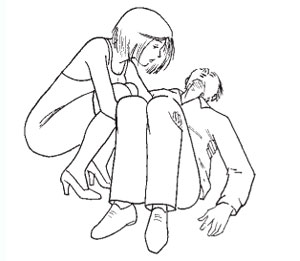



Proper layering is vital to staying warm and dry, especially in mountainous terrain. Wear or carry the following:
1 A first layer of long underwear (preferably polypropylene) to draw moisture off of your skin.
2 A thicker middle layer designed to trap and create warm dead air space, such as a down parka.
3 A breathable outer layer, preferably a jacket, that allows moisture out but not in.
Dry insulation is the key to your survival if you get lost or experience difficulty with the terrain. Once you are wet, it is very difficult to get dry.
1 Construct a shelter.
2 Melt snow and ice to make drinkable water.
3 Cross icebergs to get closer to land.
Test the strength of the ice by pressing lightly with a foot, then adding your weight.

Do not try to reach across icebergs.
4 Catch fish and seabirds.
Construct a fishing rod with anything available (ski pole, walking stick, spear). Seabirds can be killed with ice balls.
5 Look for seals.
You may be able to steal fish from seals. Only consider killing a seal (with a club or homemade spear to the skull) for food if your life is at risk. To make fuel from seal blubber, pound the blubber until it liquefies. Roll a small piece of material into a wick, place it in the blubber, and light. Burn moist seal skin to create smoke-signal fires.
S UNDAY , J ANUARY 6
1 Step up and into the blow, with your arms held against your body.
You must react quickly and against your instincts, which will tell you to move back and away. By moving closer, you can cut off the power of the blowyour attacker will not have as much momentum. Also, you will avoid extending your arms, which would make your own counterblow less powerful.
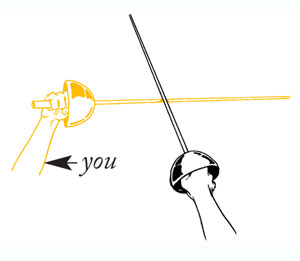
2 Push or punch at the blow instead of simply trying to absorb it with your own sword.
In a blow aimed at your head, have your sword completely parallel to the ground and above your head. The most effective block is in the center of your sword, not at the end, where you have less leverage. Always move out toward your opponent, even if you are defending and not attacking.
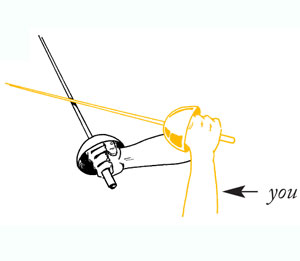
On this day in 1785, two men completed the first balloon trip across the English Channel. Jean-Pierre Franois Blanchard, a French inventor, and American doctor John Jeffries made the trip in two and a half hours inside a hydrogen balloon. Along the way, the balloon lost gas and almost fell into the channel, but the pilots kept airborne by throwing overboard all the ballast, clothing, and cargo (except an international mail package). They successfully made the first international airmail delivery when they landed in the Felmores Forest in France.
In 1951, a bird that had been believed extinct since 1615 was rediscovered in Bermuda. After almost 330 years, several pairs of cahows were discovered nesting on an offshore islet in Castle Harbor. During the seventeenth-century colonization of Bermuda, the cahow population was decimated by the introduction of new mammal species. Todays surviving seabirds are under strict protection and are still endangeredtheir current population is estimated at 250. The cahow, a symbol of hope, is the national bird of Bermuda.
Font size:
Interval:
Bookmark:
Similar books «2013 Daily Calendar: Worst-Case Scenario»
Look at similar books to 2013 Daily Calendar: Worst-Case Scenario. We have selected literature similar in name and meaning in the hope of providing readers with more options to find new, interesting, not yet read works.
Discussion, reviews of the book 2013 Daily Calendar: Worst-Case Scenario and just readers' own opinions. Leave your comments, write what you think about the work, its meaning or the main characters. Specify what exactly you liked and what you didn't like, and why you think so.



